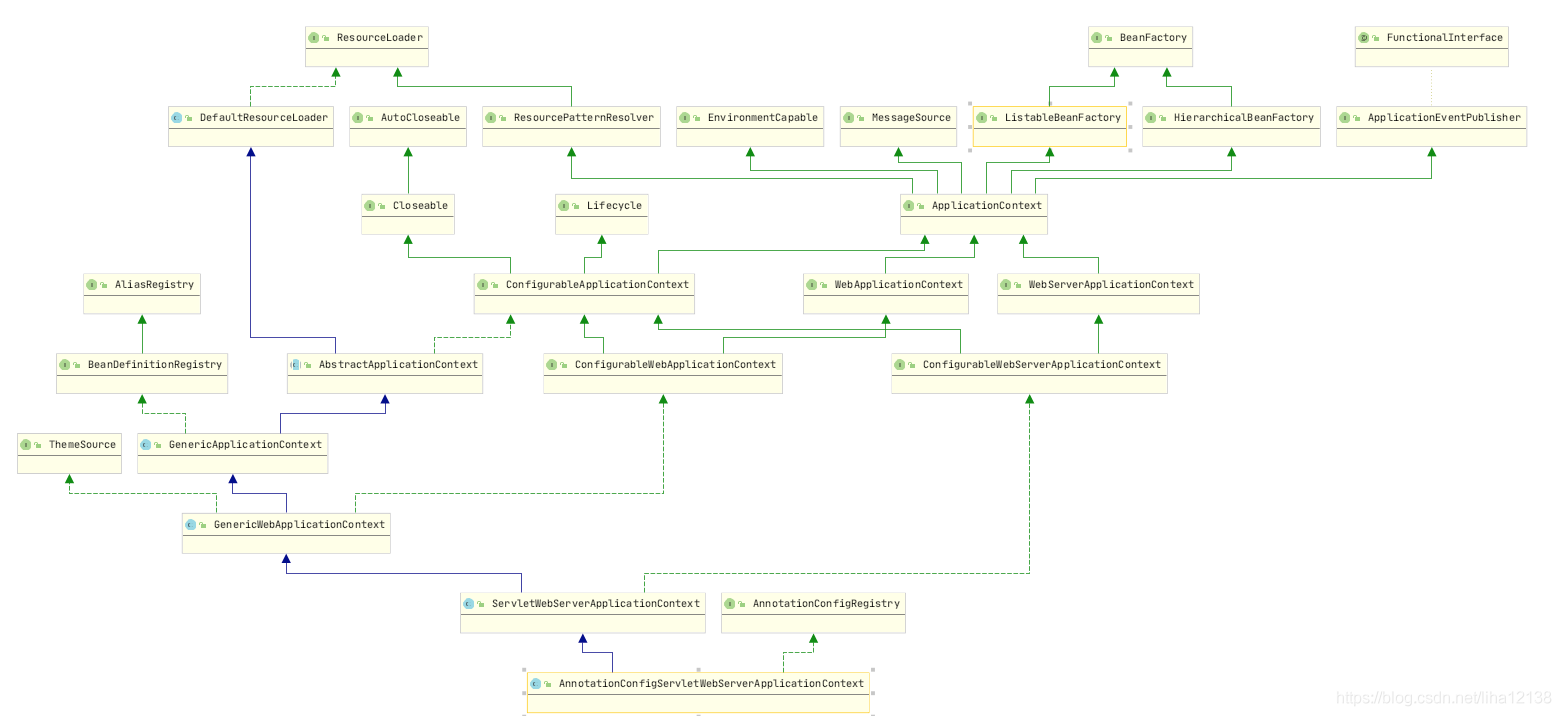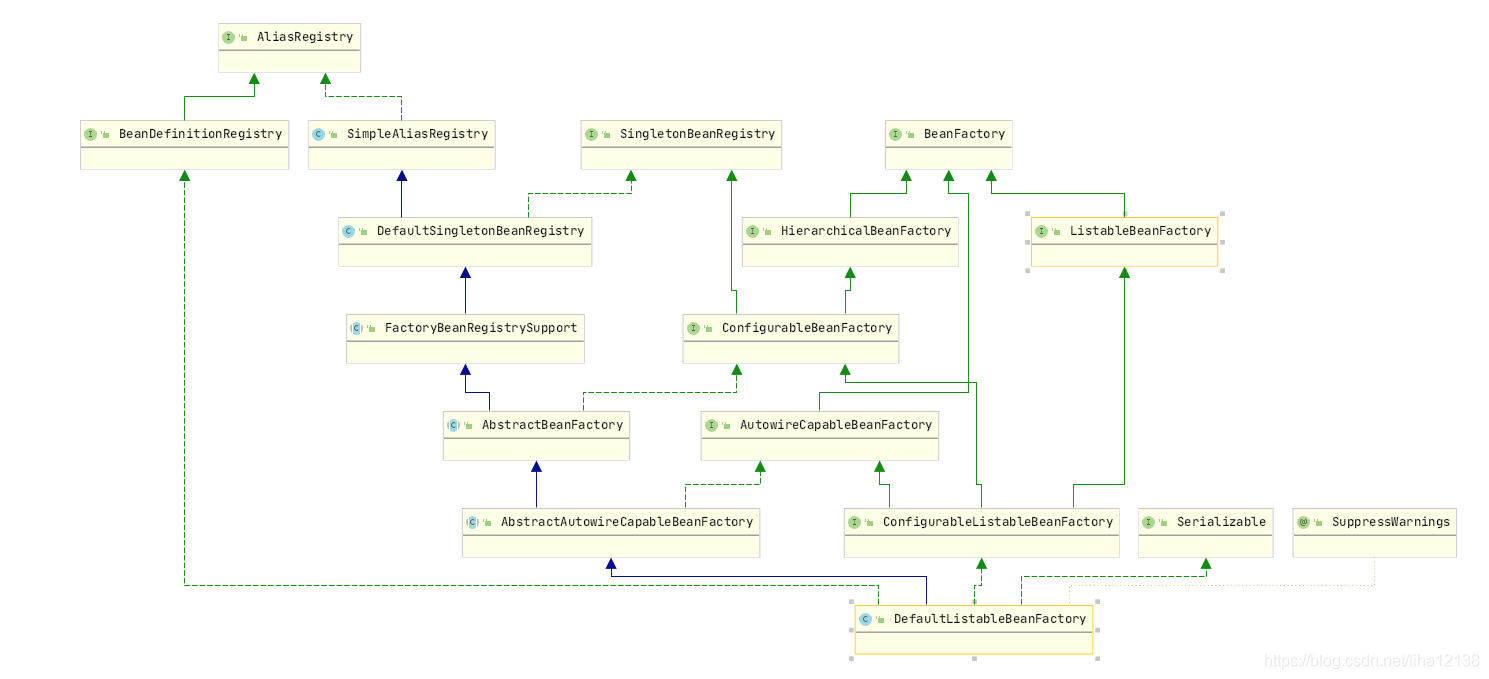SpringApplication构造方法
- 加载并初始化META-INF/spring.factories,保存到SpringAppliction对象中。
- 实例化Bootstrapper
- 实例化ApplicationContextInitializer
- 实例化ApplicationListener
版本
1
2
spring: 5.3.1
spring-boot: 2.4.0
run方法
1. 计时
2. 根据META-INF/spring.factories初始化DefaultBootstrapContext
3. 实例化SpringApplicationRunListener
1
2
org.springframework.boot.SpringApplicationRunListener=\
org.springframework.boot.context.event.EventPublishingRunListener
4. 将ApplicationListener全都装入到SpringApplication.listeners
- 执行SpringApplicationRunListener.starting()
5. 准备环境,配置
1. 加载常规环境
2. 执行SpringApplicationRunListener.environmentPrepared()
3. load factories EnvironmentPostProcessor.class,
- 创建ReflectionEnvironmentPostProcessorsFactory
- 对factories中定义的EnvironmentPostProcessor进行初始化
- 执行postProcessEnvironment
- 添加随机数据源
- 替换封装类OriginAwareSystemEnvironmentPropertySource,启动参数,jvm参数,系统环境变量
- 解析spring.application.json中的配置
- 解析vcap.application属性
- 解析配置文件中的配置属性
- 响应式调试配置中的属性
4. 根据配置初始化日志系统的配置,注册ShutdownHook
5. 对一些耗时的对象进行提前初始化(可选)

6.配置spring.beaninfo.ignore
7.打印banner
8. 创建AnnotationConfigServletWebServerApplicationContext

- 执行子类构造方法前,先执行父类的构造方法
1. AbstractApplicationContext
1 2 3
public AbstractApplicationContext() { this.resourcePatternResolver = getResourcePatternResolver(); }
2. GenericApplicationContext
1 2 3
public GenericApplicationContext() { this.beanFactory = new DefaultListableBeanFactory(); }
1. 重要,创建beanFactory

2. AbstractAutowireCapableBeanFactory
- 添加一些忽略的依赖,默认使用cglib子类初始化策略
1 2 3 4 5 6 7 8 9 10 11 12
public AbstractAutowireCapableBeanFactory() { super(); ignoreDependencyInterface(BeanNameAware.class); ignoreDependencyInterface(BeanFactoryAware.class); ignoreDependencyInterface(BeanClassLoaderAware.class); if (IN_NATIVE_IMAGE) { this.instantiationStrategy = new SimpleInstantiationStrategy(); } else { this.instantiationStrategy = new CglibSubclassingInstantiationStrategy(); } }
3. 最后回到当前类AnnotationConfigServletWebServerApplicationContext
1
2
3
4
public AnnotationConfigServletWebServerApplicationContext() {
this.reader = new AnnotatedBeanDefinitionReader(this);
this.scanner = new ClassPathBeanDefinitionScanner(this);
}
9. 记录applicationcontext启动时的情况
10. 准备context
1. 将springboot准备好的environment覆盖到context中的environment
1
2
3
4
super.environment = environment;
this.reader.setEnvironment(environment);
this.scanner.setEnvironment(environment);
2. ApplicationContext执行后置处理器
3. 执行ApplicationContextInitializer
- 获取spring.factores中配置的ApplicationContextInitializer
- 执行environment中要配置的context.initializer.classes,实例化后执行initialize
- 添加CachingMetadataReaderFactoryPostProcessor
- environment配置spring.application.name写到applicationContext中的id属性中,并注册到beanFactory
- 添加BeanFactory ,ConfigurationWarningsPostProcessor
- 添加一些记录日志报告的listener
4. 执行contextPrepared事件
5. bootstrapContext执行关闭事件
6. 打印启动信息
7. 获取对应环境下的日志配置
8. 向beanFactory中注册引导期创建的一些特殊的对象
1
2
3
4
5
6
7
8
9
10
11
beanFactory.registerSingleton("springApplicationArguments", applicationArguments);
if (printedBanner != null) {
beanFactory.registerSingleton("springBootBanner", printedBanner);
}
if (beanFactory instanceof DefaultListableBeanFactory) {
((DefaultListableBeanFactory) beanFactory)
.setAllowBeanDefinitionOverriding(this.allowBeanDefinitionOverriding);
}
if (this.lazyInitialization) {
context.addBeanFactoryPostProcessor(new LazyInitializationBeanFactoryPostProcessor());
}
9. 将启动类注册到BeanFactory中
1. createBeanDefinitionLoader
1
2
3
4
5
6
7
8
9
10
11
12
13
/**
* BeanDefinitionLoader 能将sources中的bean通过以下的几种方式注册到registry中
*/
BeanDefinitionLoader(BeanDefinitionRegistry registry, Object... sources) {
Assert.notNull(registry, "Registry must not be null");
Assert.notEmpty(sources, "Sources must not be empty");
this.sources = sources;
this.annotatedReader = new AnnotatedBeanDefinitionReader(registry);
this.xmlReader = (XML_ENABLED ? new XmlBeanDefinitionReader(registry) : null);
this.groovyReader = (isGroovyPresent() ? new GroovyBeanDefinitionReader(registry) : null);
this.scanner = new ClassPathBeanDefinitionScanner(registry);
this.scanner.addExcludeFilter(new ClassExcludeFilter(sources));
}
2. 通过启动类,通过启动类注册bean
10. 执行ApplicationPreparedEvent事件
- EnvironmentPostProcessorApplicationListener 将所有延迟日志切换到其提供的目的地。
- LoggingApplicationListener 将一些日志相关的bean对象注册到beanFactory中
- BackgroundPreinitializer
- DelegatingApplicationListener
执行用户自定义事件
11. refreshContent
1. 注册应用shutdown钩子
2. AbstractApplicationContext执行refresh方法
- 注意此处为父类中定义的刷新context步骤的模板,查看执行方法优先查看子类(AnnotationConfigServletWebServerApplicationContext)的实现。
1. 设置启动步骤日志
1
StartupStep contextRefresh = this.applicationStartup.start("spring.context.refresh");
2. 准备刷新
1
prepareRefresh();
- AnnotationConfigServletWebServerApplicationContext
- 清空元数据缓存
- 调用父类prepareRefresh方法
- AbstractApplicationContext
- 计时
- 修改context状态
- 打印刷新日志
- 在上下文环境中初始化任何占位符属性源。
1 2 3 4 5 6 7 8 9 10 11 12 13 14 15
public static void initServletPropertySources(MutablePropertySources sources, @Nullable ServletContext servletContext, @Nullable ServletConfig servletConfig) { Assert.notNull(sources, "'propertySources' must not be null"); // "servletContextInitParams" String name = StandardServletEnvironment.SERVLET_CONTEXT_PROPERTY_SOURCE_NAME; if (servletContext != null && sources.get(name) instanceof StubPropertySource) { sources.replace(name, new ServletContextPropertySource(name, servletContext)); } // "servletConfigInitParams" name = StandardServletEnvironment.SERVLET_CONFIG_PROPERTY_SOURCE_NAME; if (servletConfig != null && sources.get(name) instanceof StubPropertySource) { sources.replace(name, new ServletConfigPropertySource(name, servletConfig)); } }
- 验证environment中必须项
- 刷新前注册监听器
- 储存上下文刷新前的监听器
- earlyApplicationEvents(null -> new LinkedHashSet<>();)
3. 刷新上下文内部的beanFactory,并返回
- GenericApplicationContext
```java
/**
- 因为已经执行构造方法时,已经创建了内置的beanFactory,这里不再做刷新操作,将ApplicationContext的id写到beanFactory中
*/
@Override
protected final void refreshBeanFactory() throws IllegalStateException {
if (!this.refreshed.compareAndSet(false, true)) {
throw new IllegalStateException(
“GenericApplicationContext does not support multiple refresh attempts: just call ‘refresh’ once”);
}
this.beanFactory.setSerializationId(getId());
}
```
4. 准备beanFactory
- 将context的类加载器给beanFactory
- 配置是否忽略el配置
- 添加能织入bean中常量的,属性赋值? ```java beanFactory.addPropertyEditorRegistrar(new ResourceEditorRegistrar(this, getEnvironment()));
- 因为已经执行构造方法时,已经创建了内置的beanFactory,这里不再做刷新操作,将ApplicationContext的id写到beanFactory中
*/
@Override
protected final void refreshBeanFactory() throws IllegalStateException {
if (!this.refreshed.compareAndSet(false, true)) {
throw new IllegalStateException(
“GenericApplicationContext does not support multiple refresh attempts: just call ‘refresh’ once”);
}
this.beanFactory.setSerializationId(getId());
}
```
1
2
3
4
5
6
7
8
9
10
11
4. 注入ApplicationContext相关的接口
- ApplicationContextAwareProcessor能够扫描类中是否实现ApplicationContext,如果实现能够通过BeanPostProcessor的方式实现对ApplicationContext中相关的值作为注入,从而可以忽略ApplicationContext相关的接口进行依赖注入。
```java
beanFactory.addBeanPostProcessor(new ApplicationContextAwareProcessor(this));
beanFactory.ignoreDependencyInterface(EnvironmentAware.class);
beanFactory.ignoreDependencyInterface(EmbeddedValueResolverAware.class);
beanFactory.ignoreDependencyInterface(ResourceLoaderAware.class);
beanFactory.ignoreDependencyInterface(ApplicationEventPublisherAware.class);
beanFactory.ignoreDependencyInterface(MessageSourceAware.class);
beanFactory.ignoreDependencyInterface(ApplicationContextAware.class);
beanFactory.ignoreDependencyInterface(ApplicationStartup.class);
- 注册一些上下文相关的依赖
1 2 3 4
beanFactory.registerResolvableDependency(BeanFactory.class, beanFactory); beanFactory.registerResolvableDependency(ResourceLoader.class, this); beanFactory.registerResolvableDependency(ApplicationEventPublisher.class, this); beanFactory.registerResolvableDependency(ApplicationContext.class, this);
-
对ApplicationListener类的BeanPostProcessor进行实现
- 对environment、systemProperties、systemEnvironment、applicationStartup类进行注册
5. 执行子类的postProcessBeanFactory
- ServletWebServerApplicationContext 用BeanPostProcessor的方式让applicationContext能够实现ServletContext和ServletConfig的自动注入 ,并且停止ServletContextAware类型的依赖注入。
- 注册web类型的applicationContext的bean的作用空间,如:request,session。
6.记录启动过程
7. invokeBeanFactoryPostProcessors
1. 处理invokeBeanDefinitionRegistryPostProcessors
- 调用
1 2 3 4 5 6
/** *在标准初始化之后修改应用程序上下文的内部 bean 定义注册表。 所有 **常规** bean 定义都将被加载,但尚未实例化任何 bean。 ***这允许在BeanFactoryPostProcessor 开始之前添加更多的 bean 定义。*** */ public interface BeanDefinitionRegistryPostProcessor extends BeanFactoryPostProcessor { void postProcessBeanDefinitionRegistry(BeanDefinitionRegistry registry) throws BeansException; }
- 首先,调用实现 Priority Ordered 的 Bean 定义注册表后处理器。
1
beanFactory.isTypeMatch(ppName, PriorityOrdered.class
- 接下来,调用实现 Ordered 的 Bean 定义注册表后处理器。
1
!processedBeans.contains(ppName) && beanFactory.isTypeMatch(ppName, Ordered.class)
- 最后,调用所有其他 Bean 定义注册表后处理器,直到不再出现其他 Bean 定义注册表后处理器。
2. 处理invokeBeanFactoryPostProcessors
-
调用,和BeanDefinitionRegistryPostProcessors时机相同,但是此时执行时说明常规的不常规的bean定义都已经加载完成了。 ```java public interface BeanFactoryPostProcessor {
/**
- 所有 bean 定义都将被加载,但没有 bean将已经被实例化。这允许覆盖或添加属性甚至提前初始化bean。 */ void postProcessBeanFactory(ConfigurableListableBeanFactory beanFactory) throws BeansException;
}
1
2
3
4
5
6
7
8
9
10
11
12
13
14
15
16
17
18
19
20
21
22
23
24
25
26
27
28
29
30
31
32
33
34
35
36
37
38
39
40
41
42
43
44
45
46
47
48
49
50
51
52
53
54
55
56
57
58
59
60
61
62
63
64
65
66
67
68
69
70
71
72
- 同样的,按照优先order, order,常规的postProcessors顺序进行执行。
# 关键类
## 1. DelegatingApplicationListener
- 读取environment 中context.listener.classes配置的applictionlister
## 2. DelegatingApplicationContextInitializer
- 读取environment 中context.initializer.classes
# 监听器触发事件
```java
package org.springframework.boot;
public interface SpringApplicationRunListener {
/**
* 当 run 方法第一次启动时立即调用。 可用于非常早的初始化。
*/
default void starting(ConfigurableBootstrapContext bootstrapContext) {
starting();
}
@Deprecated
default void starting() {
}
/**
* environment准备好,但在ApplicationContext被创建之前调用。
*/
default void environmentPrepared(ConfigurableBootstrapContext bootstrapContext,
ConfigurableEnvironment environment) {
environmentPrepared(environment);
}
@Deprecated
default void environmentPrepared(ConfigurableEnvironment environment) {
}
/**
* 在创建并准备好ApplicationContext ,但在加载源之前调用。
*/
default void contextPrepared(ConfigurableApplicationContext context) {
}
/**
* 在加载应用程序上下文后但在刷新之前调用。
*/
default void contextLoaded(ConfigurableApplicationContext context) {
}
/**
* 上下文已刷新且应用程序已启动,但尚未调用CommandLineRunners和ApplicationRunners 。
*/
default void started(ConfigurableApplicationContext context) {
}
/**
* 在 run 方法完成之前立即调用,此时应用程序上下文已刷新并且所有CommandLineRunners和ApplicationRunners已被调用。
*/
default void running(ConfigurableApplicationContext context) {
}
/**
* 在运行应用程序时发生故障时调用。
*/
default void failed(ConfigurableApplicationContext context, Throwable exception) {
}
}